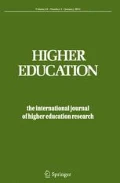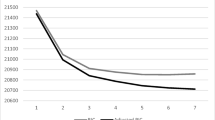Abstract
The subjects (N = 175), freshmen and fifth year students in psychology (n = 59) and medicine (n = 116), described their modes of studying by answering open-ended questions and Likert-type questions, presented to them within a task booklet. They were first asked to write down their own subjective definitions of learning. Scales to classify the answers were adopted from Lonka et al. (1990). Second, subjects were given a comprehension monitoring probe adopted from Ryan (1984). Responses were analysed to determine the specific comprehension criteria the student employed. Third, students rated a set of 71 statements concerning learning styles, regulation of learning, and conceptions of learning (Entwistle & Ramsden, 1983; Vermunt & van Rijswijk, 1988). Embedded in the last set of statements were seven items that were used to classify students as dualists or relativists (Perry, 1968; Ryan, 1984).
It was found that constructivist conceptions of learning were the most typical of (advanced) psychology students, whereas learning was more often seen as intake of knowledge by the medical students. Highest dualism scores were obtained by the first year students, especially medical students. In general, dualists were more likely to report knowledge comprehension criteria to test their understanding than were relativists, and dualists' conceptions of learning were also more passive. Four principal components were identified that reflected qualitatively different approaches to learning and knowledge: externally regulated and reproduction-directed learning (PC1), self-regulated, meaning-directed, and goal-oriented learning (PC2), constructivist epistemology (PC3), and active professional orientation (PC4). Medical students scored higher on variables related to PC1 and PC4, whereas psychology students scored higher on scales associated with PC2 and PC3.
Similar content being viewed by others
References
Albanese, M.A. & Mitchell, S. (1993). ‘Problem-based learning: A review of literature on its outcomes and implementation issues’, Academic Medicine 68, 52–81.
Bereiter, C. & Scardamalia, M. (1987). The psychology of written composition Hillsdale, N.J.: Lawrence Erlbaum Associates.
Bereiter, C. & Scardamalia, M. (1989). ‘Intentional learning as a goal for instruction’, in Resnick L.B. (ed.) Knowing, learning and instruction: Essays in honor of Robert Glaser. (p. 361–392). Hillsdale, N.J.: Lawrence Erlbaum Associates.
Biggs, J. (1993). ‘What do inventories of students learning processes really measure? A theoretical review and clarification’, British Journal of Educational Psychology 63, 3–19.
Entwistle, A. & Entwistle, N. (1992). ‘Experiences of understanding in revising for degree examinations’, Learning and Instruction 2, 1–22.
Entwistle, N. & Ramsden, P. (1983). Understanding student learning. London: Croom Helm.
Entwistle, N. & Tait, H. (1990). ‘Approaches to learning, evaluations of teaching, and preferences for contrasting academic enviroments’, Higher Education 19, 169–194.
Entwistle, N. & Waterston, S. (1988). ‘Approaches to studying and levels of processing in university students’, British Journal of Educational Psychology 58, 258–265.
Gilhooly, K.J. (1990). ‘Cognitive psychology and medical diagnosis’, Applied Cognitive Psychology 4, 261–272.
Glaser, R. (1991). ‘The maturing of the relationship between the science of learning and cognition and educational practice’, Learning and Instruction 1, 129–144.
Glaser, K., Hojat, M., Veloski, J.J., Blacklow, R.S., & Goepp, E.C. (1992). ‘Science, verbal, or quantitative skills: which is the most important predictor of physician competence?’, Educational and Psychological Measurement 52, 395–406.
Järvinen, A. (1985). Lääketieteen opiskelijoiden tieteellisiä ja ammatillisia käsityksiä koskeva seurantatutkimus. (A follow-up study on the development of scientific and professional conceptions in medical students). Acta Universitatis Tamperensis A 197. University of Tampere. (In Finnish).
Lindblom-Ylänne, S., Lonka, K. & Maury, S., (1992). Miten aineistokokeessa menestyminen ennustaa alkuvaiheen opintomenestystä? (How does success in reading comprehension test predict success in medical school?) Helsingin yliopiston opintoasiain julkaisuja 4. University of Helsinki. (In Finnish).
Lonka, K., Joram, E., & Bryson, M. (1990, April). Student's changing conceptions of knowledge and learning. A poster presented at AERA Annual Meeting, April 16–20 1990, Boston, MA.
Lonka, K., Joram, E., & Bryson, M. (1994, June). Changing conceptions of learning in educational psychology. A paper presented at EARLI SIG “Comprehension of Verbal and Pictorial Information” Third Working Conference, Helsinki, Finland, June 6–8, 1994. Submitted for publication.
Lonka, K., Lindblom-Ylänne, S. & Maury, S. (1993, July). Study strategies, learning from text, and success in medical school: A follow-up study. A paper presented at invited symposium “Improving the quality of student learning in higher education: Research using psychological concepts and research methods”. Organizer: Professor Noel Entwistle, UK. III European Congress of Psychology, July 4–9, 1993, Tampere, Finland.
Lonka, K., Lindblom-Ylänne, S. & Maury, S. (1994). ‘The effect of study strategies on learning from text’, Learning and Instruction 4, (3), 253–271.
Lonka, K. & Lindblom-Ylänne, S. (in preparation). Conceptions of learning, epistemologies, and study success in medicine and psychology. A paper to be presented in 6th EARLI Conference, Nijmegen, The Netherlands, August 26 to 31, 1995.
Marton, F. & Säljö, R. (1976). ‘On qualitative differences in learning - I. Process and outcome’, British Journal of Educational Psychology 46, 4–11.
Marton, F., Hounsell, D.J. & Entwistle, N.J. (1984). (Eds.) The experience of learning. Edinburgh, UK: Scottish Academic Press.
Meyer, J.H.F. (1991). ‘Study orchestration: the manifestation, interpretation and consequences of contextualised approaches to studying’, Higher Education 22, 297–316.
Meyer, J.H.F., Parsons, P. & Dunne, T.T. (1990). ‘Individual study orchestrations and their association with learning outcome’, Higher Education 20, 67–89.
Perry, W.G. (1968). Patterns of development in thought and values of students in a liberal arts college. A validation of a scheme. U.S. Department of Health, Education, and Welfare, Office of Education, Bureau of Research, Final Report, Project No. 5-0825, Contract No. SAE 8973, April, 1968.
Perry, W.G. (1970). Forms of intellectual and ethical development in the college years: A scheme. New York: Holt, Rinehart & Winston.
Ramsden, P. (1988). ‘Context and strategy. Situational influences on learning’ in Schmeck, R.R. (ed.), Learning strategies and learning styles. New York: Plenum Press.
van Rossum, E.J. & Schenk, S.M. (1984). ‘The relationship between learning conception, study strategy and learning outcome’, British Journal of Educational Psychology 54, 73–83.
Ryan, M. P. (1984). ‘Monitoring text comprehension: Individual differences in epistemological standards’, Journal of Educational Psychology 76, (2), 248–258.
Säljö, R. (1979). Learning in the learner's perspective I. Some common sense conceptions. Reports from the Institute of Education No 76. Sweden: University of Göteborg.
Scardamalia, M. & Bereiter, C. (1991). ‘Literate expertise’, in Andersson, K.A. & Smith, J. (eds.), Toward a general theory of expertise. Prospects and limits (pp. 137–165). Cambridge, MA: Cambridge University Press.
Thomas, P.R. & Bain, J.D. (1984). ‘Contextual dependence of learning approaches: The effects of assessments’, Human Learning 3, 227–240.
Tooth, D., Tonge, K. & McManus, I.C. (1989). ‘Anxiety and study methods in preclinical students: Causal relation to examination performance’, Medical Education 23, 416–421.
Viitala, T. (1991). Ymmärtävätkö yliopisto-opiskelijat lukemansa? (Do University students comprehend what they read?) Acta Universitatis Ouluensis E 6. University of Oulu. An English abstract. (In Finnish).
Vermunt, J.D.H.M. & van Rijswijk, F.A.W.M. (1988). ‘Analysis and development of students' skill in selfregulated learning’, Higher Education 17, 647–682.
Weinstein, C.E. & Mayer, R.E. (1986). ‘The teaching of learning strategies’, in Wittrock, M.C. (ed.) Handbook of research on teaching (3rd ed., pp. 315–327). New York: MacMillan.
Author information
Authors and Affiliations
Rights and permissions
About this article
Cite this article
Lonka, K., Lindblom-Ylänne, S. Epistemologies, conceptions of learning, and study practices in medicine and psychology. High Educ 31, 5–24 (1996). https://doi.org/10.1007/BF00129105
Issue Date:
DOI: https://doi.org/10.1007/BF00129105




